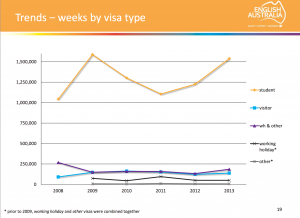Chief Executive at English UK, Eddie Byers, has stated that the UK’s ELT sector needs to work harder to make the UK government understand that it is an integral channel or “key feed” into the HE sector.
News and business analysis for Professionals in International Education
Have some pie!
Cohesion is critical, underline peak bodies at ALTO
 Representatives from seven peak bodies presented on industry trends and challenges to ALTO delegates
Representatives from seven peak bodies presented on industry trends and challenges to ALTO delegates “We have to make our arguments about relevance,” he said, as the HE sector had done, claiming that the ELT sector’s role in ensuring well prepared students for degree level study “is not properly understood by government”.
All the peak body leaders speaking at the recent ALTO dialogue agreed that industry engagement across a country’s language teaching sector and with government is critical to make headway with policy that can encourage business for members.
Sue Blundell, representing English Australia (EA), spoke about how EA had “achieved equity” with other peak bodies in Australia and had created allies across other organisations so that a united front could be presented to government.
“The government speaks to us first,” she said, underlining that international education is considered one of the “fantastic five” export sectors now by government – a sector that is seeing growth across the board too, as she illustrated in granular detail.
In total, there were an extra 16,000 student visas granted in 2013, which is where the growth is focused in Australia, rather than working holiday visa holders or those on tourist visas.
Blundell underlined that 39% of those studying English in Australia progress into another study sector
And Blundell underlined that 39% of those studying English in Australia progress into another study sector.
Cohesive work rights upon graduation is clearly one big draw factor, with Blundell citing Vietnam, for example, as a fast-growing country with HE in its sights.
Genevieve Abela of FELTOM in Malta also explained that the comprehensive data available in Malta enabled her to “open doors and have the conversation” while representing the sector.
With 13% of all bed nights in Malta being booked by an English language student, Abela also underlined how important the ELT sector is in Malta (and, in fact, one of the least seasonal).
Byers presented a comprehensive view of UK business, revealing that generally-stable source countries are sending more students but they are staying for a shorter time overall. The junior sector is flourishing, while the adult market slowed in 2014.
He foresaw plenty of long-term opportunity however, including the rise in English as a Medium of Instruction (EMI) as an opportunity, blended delivery and English “plus” specialist programming.
Representing Languages Canada, Sharon Curl surprised some with her acknowledgement that China is only a significant market for public sector members, with most private programmes unable to get visas to teach Chinese students.
Curl also revealed that 2013 and 2014 had presented challenges in Canada, with the visa officers strike and change in ISP regulations – also affecting the ability of some schools to offer co-op/intern programmes – all having a restrictive impact on numbers. Student weeks across all members were down by 1.5% in 2013 compared with 2012, for example.
But Curl was upbeat about the outlook ahead now that agents are familiar with the new regulatory landscape, which has enhanced the quality of the sector. She acknowledged that post-study work rights in Canada were a motivating factor in some markets and a selling point that Canada had to maximise.
Post-study work rights in Canada were a selling point that Canada had to maximize
Caroline O’Neal, representing English USA, also spoke of some regulatory challenges around the definition of pathway programmes that the sector is working through with the government.
She outlined the organisation’s new mission around advocacy, standards and outreach and its regional events that have helped mobilise the diverse membership and also given the association a “bigger voice” in Washington DC.
Ireland was not immune to challenges either, and David O’Grady of Marketing English in Ireland (MEI) described the “organised crime” that had used the umbrella of ELT and had now been caught out.
Predicting a more stable year ahead with a new regulatory regime in January and new standards at MEI schools, O’Grady also revealed he believed Erasmus + funded scholarships could yield strong potential for Irish schools. He is keen to enable more synergy between the ELT and HE sectors in Ireland.
And ensuring that the non-ELT markets were represented, Carmen Sanchez was there on behalf of FEDELE in Spain, revealing a focus on quality allegiance and strong relations with Instituto Cervantes were among the priorities across a fragmented membership.
Sanchez agreed with other markets, notably the UK, when she said that juniors and groups were a buoyant market segment, with Spanish students getting younger.
Still looking? Find by category:




6 Responses to Cohesion is critical, underline peak bodies at ALTO